
Alice Coltrane, also known by her adopted Sanskrit name Turiyasangitananda, was an American jazz musician and composer, and in her later years a swamini. An accomplished pianist and one of the few harpists in the history of jazz, she recorded many albums as a bandleader, beginning in the late 1960s and early 1970s for Impulse! and other record labels. She was married to jazz saxophonist and composer John Coltrane, with whom she performed in 1966–1967. One of the foremost exponents of spiritual jazz, her eclectic music proved widely influential both within and outside the world of jazz.

Ptah, the El Daoud, recorded and released in 1970, is the third solo album by Alice Coltrane. The album was recorded in the basement of her house in Dix Hills on Long Island, New York.

A Monastic Trio is the first solo album by Alice Coltrane. Recorded in 1968, she intended it to be a tribute to her husband, John Coltrane, who had died the year before. It originally featured the message: "This music is dedicated to the mystic, Ohnedaruth, known as John Coltrane during the period from September 23, 1926 to July 17, 1967."
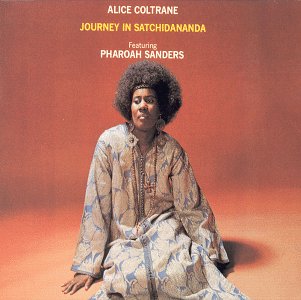
Journey in Satchidananda is the fourth solo album by Alice Coltrane. Its title reflects Coltrane's inspiration by Swami Satchidananda whom Coltrane had become close to while being his disciple.

Deaf Dumb Blind is an album by the American jazz saxophonist Pharoah Sanders. It was recorded at A & R Studios in New York City on July 1, 1970, and released on Impulse! Records in the same year. The album's title is bilingual: "Summun Bukmun Umyun" is Arabic for "Deaf Dumb Blind".

Divine Songs is an album by Swamini Turiyasangitananda, formerly known as Alice Coltrane. It is an album composed of devotional songs from the Hindu religion. The songs are accompanied by Turiya's signature playing on the Wurlitzer organ. She plays the songs on the organ, beginning with the traditional Indian mode but then improvises and stretches it until it turns back on itself musically. Her use of breaks, syncopation and harmonic invention re-image the songs into something original and nearly unclassifiable.
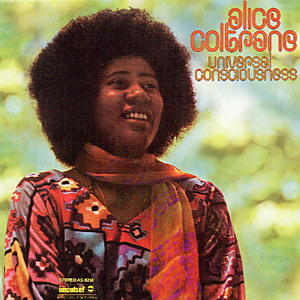
Universal Consciousness is the fifth solo album by Alice Coltrane, released in 1971 on Impulse! Records. It was re-released on CD in 2002.

Translinear Light is the final studio album by American jazz pianist Alice Coltrane, released in September, 2004 on Impulse Records. It was produced by her son Ravi Coltrane, who also played saxophone for the album as did her third son Oran. In addition to original compositions, it includes two by her husband John Coltrane and four interpretations of traditional songs.

Eternity is an album by Alice Coltrane. It was recorded in August through October, 1975, and was released in 1976 by Warner Records, her first release with the label. On the album, Coltrane is joined by ensembles of varying size. It was Coltrane's first album following both her move to California and her decision to become a monastic.

The Classic Quartet – The Complete Impulse! Recordings is a 1998 box set by jazz musician John Coltrane.

Cosmic Music is a jazz album by John Coltrane and Alice Coltrane released after John Coltrane's death. John Coltrane only plays on two tracks, "Manifestation" and "Reverend King".

Albert Ayler In Greenwich Village is a 1967 live album by free jazz saxophonist Albert Ayler. It was his first album for Impulse! Records, and is generally regarded as being his best for the label.
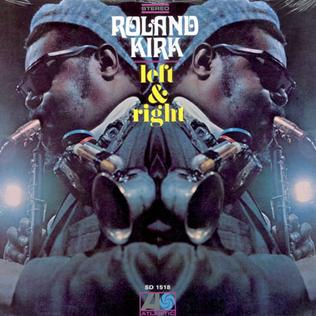
Left & Right is an album by the jazz multi-instrumentalist Roland Kirk, released on the Atlantic label in 1968. It contains performances by Kirk with Jim Buffington, Julius Watkins, Frank Wess, Rahn Burton, Vernon Martin and Roy Haynes, with Warren Smith, Richard Williams, Dick Griffin, Benny Powell, Pepper Adams, Alice Coltrane, Jimmy Hopps, Daniel Jones and Gerald "Sonny" Brown featuring on an extended track with orchestration by Gil Fuller.
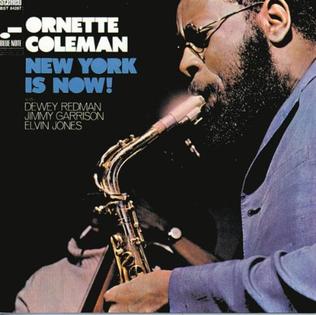
New York Is Now! is an album by the American jazz saxophonist and composer Ornette Coleman released on the Blue Note label in 1968.
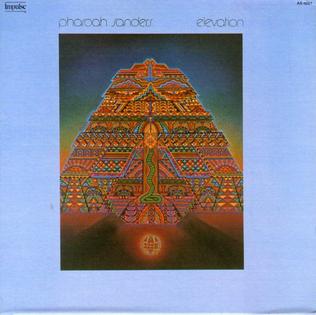
Elevation is a live album by American saxophonist and composer Pharoah Sanders, released in 1973 on the Impulse! label.
Radha Renee Reyes-Botofasina is an Afro-Cuban American harpist, pianist and vocalist from Brooklyn, N.Y.

Cryptology is an album by jazz saxophonist David S. Ware, recorded in 1994 and released by Homestead Records.

Spiritual jazz is a sub-genre of jazz that originated in the United States during the 1960s. The genre is hard to characterize musically but draws from free, avant-garde and modal jazz and thematically focuses on transcendence and spirituality. John Coltrane's 1965 album A Love Supreme is considered landmark in the genre.

Radha-Krsna Nama Sankirtana is an album by Alice Coltrane. It was recorded in California in August 1976, and was released in 1977 by Warner Bros. On the album, Coltrane is joined by students from the Vedantic Center, who sing, clap, and play hand percussion, and by her daughter Sita Michelle Coltrane and son Arjuna John Coltrane Jr.

















